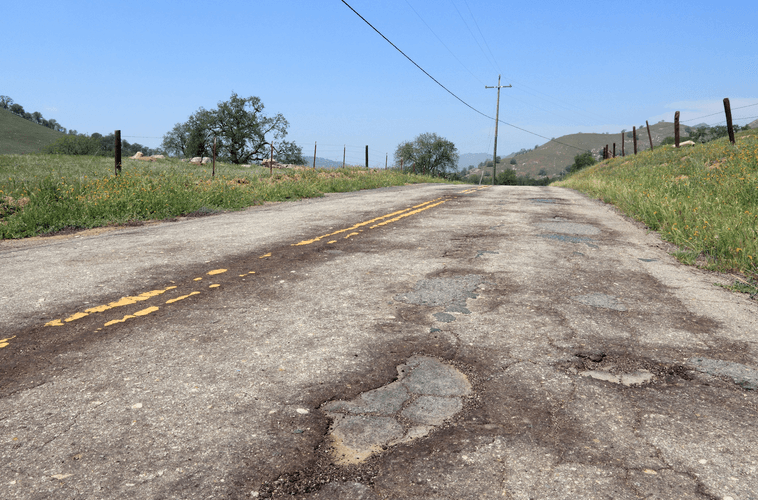I Just Hit a Pothole: Is My Car Okay?
Auto Shops Located in: Chapel Hill, Durham, Taleigh, Apex, and Cary North Carolina

Most of us have done it: you’re driving along and, at the last second, see a massive pothole in the road. You try to avoid it, but it’s too late, and you brace yourself for that heavy *thunk*.
Hitting a pothole is a stressful moment for every driver. Potholes can wreak havoc on your vehicle in many different ways, and it can be hard to initially tell how much a pothole has damaged your car. In this article, we’ll go over the different types of pothole car damage that can happen, what you should be looking for after you hit a pothole, and whether your insurance will cover any of the damage that is caused by a pothole.
The Main Types of Pothole Damage
Potholes can cause all types of problems with different components in your car. Some of the common types of pothole damage include:
- Alignment Problems: The force from hitting a pothole can throw your car’s alignment off. If you notice uneven tire wear, steering issues, or a noticeable pull while driving in one direction, your car may have alignment issues. Alignment problems are not easy to fix, so it’s best to take your vehicle to a qualified mechanic to get it diagnosed and serviced.
- Bent Rims: Running over a pothole can crack the rims of your car’s wheels. If your rims are cracked, the structural integrity of your tires will be compromised, potentially creating areas on the wheel where air will escape.
- Damaged Tires: Unfortunately, you may need a new set of tires if a pothole does enough damage to the body of your tires. If you can’t determine how bad the damage is, it’s always a good idea to get a professional to check them out.
- Suspension Damage: Hitting a pothole can put a huge amount of strain on your vehicle’s suspension system. Parts like shocks, struts, and springs can all be compromised when you hit a pothole. If you notice your car handling differently after hitting a pothole or hear strange sounds when driving, your suspension may have issues. Suspension problems can be difficult to diagnose and fix yourself, so be sure to take your car to a mechanic if you suspect a pothole damaged your suspension.
How to Tell If a Pothole Damaged a Car: A Post-Pothole Checklist
After hitting a pothole, you can check a few things to ensure your car is safe enough to drive. You should still go get your car inspected by a mechanic if you think the damage is extensive and something feels off, but you can perform a few quick checks yourself if the damage isn’t obvious. As you try to tell if a pothole damaged your car, make sure to follow our post-pothole checklist below:
- Check Tire Pressure: After hitting a pothole, you should check your tire pressure and inspect your tires for any signs of visible damage, such as bulges, cuts, or punctures. If your tires are compromised, a mechanic can tell you if they’re salvageable or if you need a new set.
- Inspect Undercarriage: After hitting a pothole, you should visually inspect your car’s undercarriage to see if there’s any visible damage to things like your exhaust system, suspension, or frame. If there are any leaking fluids or loose parts, you need to see a mechanic ASAP!
- Listen for Unusual Sounds: Any kind of new clunking, grinding, or other unpleasant noises that pop up after hitting a pothole is a red flag. There are many different reasons that your car could be making these new noises, and a mechanic can accurately tell you what’s going on.
- Pay Attention to Steering: If your car feels different when you’re steering after hitting a pothole, it’s a sign that you need to head to a mechanic. Issues with steering could be caused by your alignment or suspension, both of which can be dangerous if damaged.
What to Do If a Pothole Damages Your Car
If you notice any signs of pothole damage after you perform the checklist above, you’ll want to check if your insurance covers the damage. If they do, you’ll likely need to take pictures of the damage and the pothole while also providing any other information the insurer needs. Sometimes, you can also file a claim against the city, country, or state in charge of the road, but you’ll want to consult with a lawyer first to see if you have a case.
Once you’ve contacted your insurer and followed their instructions, you’ll need to bring your vehicle into a repair shop to fix the damage. Most auto repair shops will be familiar with common issues caused by potholes and should be able to repair your car.
Does Your Insurance Cover Pothole Damage?
Whether or not your insurance covers pothole damage is entirely dependent on your individual plan. In some cases, your insurance may pay for some of the damage, but it is important to review your policy and see what it says about potholes.
It is worth noting that companies may have deductibles, coverage limits, and exclusions when it comes to potholes. Your premiums also may change if you file a claim after hitting one. Measure the positives and negatives of the situation before you file a claim, as you don’t want to end up in a worse situation for a fix that wouldn’t have been that expensive in the first place.
Hit a Pothole? Head to Chapel Hill Tire Auto
If you’ve recently hit a pothole and need vehicle repair services in Raleigh, Durham, Chapel Hill, or the surrounding areas, come down to Chapel Hill Tire Auto. Once you bring in your vehicle, we’ll be happy to inspect the underside of your car for any damage. We’ll also take a look at your wheels to see if they need replacing. If you end up needing a new set, we’ll work with you to find the best match for your vehicle so that you’ll be set for another six years of smooth, safe driving. We also have a great set of coupons for any other maintenance needs you might have.
If you need new tires after hitting a pothole, use our tire selection tool to find the best tires for your car. When you’re ready to bring your car in for an inspection or a pothole damage repair, please make an appointment at one of our convenient locations in the Triangle Area.















